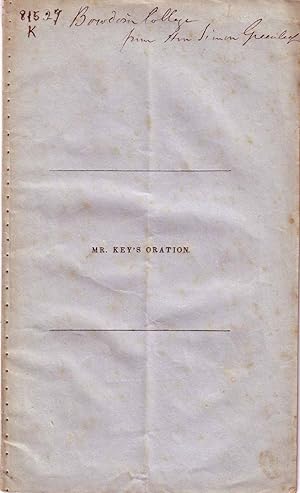About this Item
First Edition. Original printed blue wrappers. 19pp, octavo. Exceptionally scarce oration by the author of the United State national anthem, The Star-Spangled Banner, with only one library holding listed on WorldCat. This copy with penciled correction, very likely in Key's hand, on page eleven changing the word "undervaluing" to "overvaluing". Key would only see a few of his works published during his life time, a few orations and his poetry. With gift inscription to Bowdoin College by Simon Greenleaf, December 5, 1783 October 6, 1853, reporter of the Supreme Court of Maine from 1820 to 1832, and author of nine volumes of Reports of Cases in the Supreme Court of Maine (1820-1832). In 1833, Greenleaf was named to the Royall professorship, and in 1846 succeeded Judge Joseph Story as Dane professor of law at Harvard University. During the War of 1812, Key, accompanied by the American Prisoner Exchange Agent Colonel John Stuart Skinner, dined aboard the British ship HMS Tonnant, as the guests of three British officers. Skinner, Key, and Beanes were not allowed to return to their own sloop: they had become familiar with the strength and position of the British units and with the British intent to attack Baltimore. As a result of this, Key was unable to do anything but watch the bombarding of the American forces at Fort McHenry during the Battle of Baltimore on the night of September 13 September 14, 1814.When the smoke cleared, Key was able to see an American flag still waving and reported this to the prisoners below deck. On the way back to Baltimore, he was inspired to write a poem describing his experience, "The Defence of Fort McHenry", which he published in the Patriot on September 20, 1814. He intended to fit the rhythms of composer John Stafford Smith's "To Anacreon in Heaven". It has become better known as "The Star Spangled Banner". Under this name, the song was adopted as the American national anthem, first by an Executive Order from President Woodrow Wilson in 1916 (which had little effect beyond requiring military bands to play it) and then by a Congressional resolution in 1931, signed by President Herbert Hoover. Very Good in original wrappers, tiny binding holes along spine edge, library numbers in ink at top front wrap, embossing stamp from Bowdoin at title page and one interior page, modest foxing. Seller Inventory # 18573
Contact seller
Report this item
![]()
